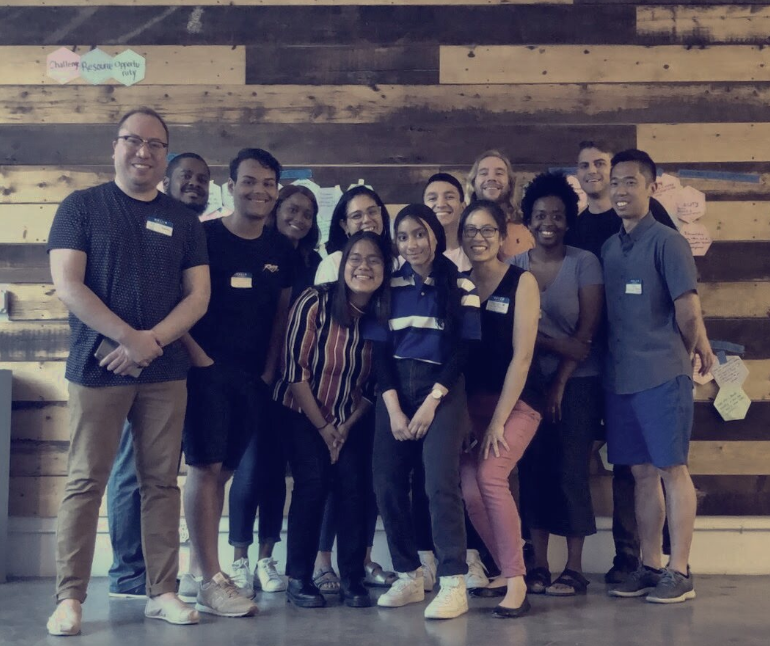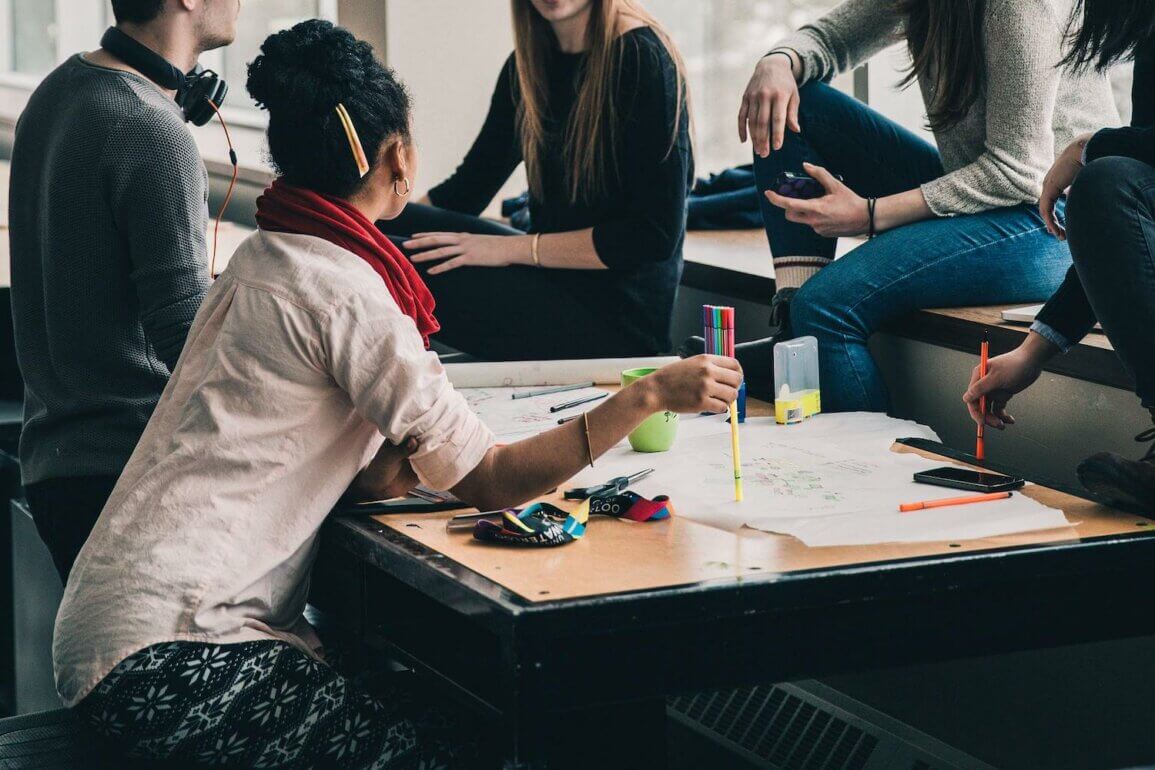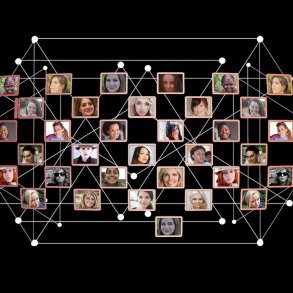By Hope Wilder and originally published on Sociocracy for All
Author’s Note for Enlivening Edge Magazine readers:
“I haven’t been in a place where my voice was listened to as much as at YPC. It’s been rewarding beyond explanation.”The Youth Power Coalition in New York City is a coalition of youth leaders and adult allies building a movement for youth-led collective impact.
They have been using sociocracy for a number of years. This case study tells of their experiences of sociocracy with people aged 16 and 17 – and how much they enjoy the participatory, empowering nature of it! Read more in this case study by Hope Wilder from Sociocracy For All.
What is Youth Power Coalition?
Youth Power Coalition (YPC) is a coalition of youth leaders and adult allies building a movement for youth-led collective impact using sociocracy. They advocate for youth decision-making power in all spaces where decisions affecting youth are made, from school boards to city halls.

Youth Power Coalition:
- Advocates for youth decision-making power, including lowering the voting age.
- Develops leaders who can lead intergenerationally.
- Mobilizes the resources needed to support youth-led collective impact initiatives.
About YPC membership
YPC focuses on including those most impacted by decisions to participate in them. YPC aims to have all circles with a majority membership of young people. One measure of success at YPC is its high level of inclusion of those most marginalized, including young people, BIPOC, people with disabilities, and from low-income backgrounds. The vision is for the most marginalized members of society to have their voices heard and included in decision-making.
The current demographics of YPC are:
- 85% young people, 50% under 15
- 100% BIPOC
- 24% with disabilities
- 74% low-income backgrounds
What is the impact of YPC on its youth members?
YPC gives its youth members the opportunity to take action about issues that are important to them, while also giving them a whole host of leadership opportunities and real-world experience in a nonprofit environment. The culture of YPC is very intentionally inclusive with an intention to share power with young people.
“So many youth out there who know what’s going on, but they don’t feel like they have the resources to really start doing something or support they need to actually take action to change issues they see.”
Emanuela, YPC member
“We’re an intergenerational community- with adult allies that don’t condescend to us and who center our voices.”
Farzana, former YPC Youth Executive Co-Director
YPC projects
YPC has several major ongoing projects.
-
- Youth Rights Advocacy: This circle holds the intention of lowering the national voting age to sixteen. In its initial stages, they plan to accomplish this by forming a coalition with other local and national organizations fighting for a lower voting age, as well as focusing on getting youth leaders onto local community boards in NYC.
- Leadership Development Circle: Sometimes when an organization run on circle principles receives a large number of new members, the organizational principle gets lost. This circle is concerned with creating a peer-to-peer method for training newcomers. The goal is to have in place an each-one-teach-one plan that scales rapidly and accommodates the fact that our youth age out of the program as others come to take their place.
- Power Hub– an online resource that helps organize youth training for anyone, with free materials and discussions.
- YPC Organizational Consulting Circle: YPC has transitioned from an adult-led to a youth-led organization. As a collective, YPC holds a lot of knowledge about how to create this transition. This circle makes their expertise available to other organizations aspiring to make the same shift.
Origins of Youth Power Coalition and implementation of sociocracy
YPC started out as #NYCEDU, a volunteer community project exploring collective impact in education which started in 2014. Founder Deborah Chang saw that there was a need to bring educators and young people in New York City together and create a community. After 5 years of hosting events, community gatherings, and conferences, the group saw the need to transition to a more formal organization.
After talking to many people as #NYCEDU about what was most needed to make a difference for youth, youth leadership emerged as the most important factor. The organization transitioned into a sociocratic nonprofit and changed its name to Youth Power Coalition, with the mission and aims centered around youth collective impact.
YPC was founded as a sociocratic organization from the beginning because of the influence of founder Deborah Chang. She read the Sociocracy for All book Many Voices One Song (Ted Rau and Jerry Koch-Gonzales) in 2019 and fell in love with sociocracy, immediately signing up for a conference. After having difficulty filing nonprofit bylaws that included a sociocratic structure, Deborah asked for help. She got help from sociocratic experts and experienced working in a sociocratic circle in early 2020.
The bylaws were filed by February 27th, 2020 and the organization launched successfully. By Spring 2020 they had grown beyond the group of five who launched the organization to about twenty people working in multiple circles: Advocacy, External Communications, Internal Communications, Outreach, and Partnerships. Many people were also new and needed to be trained in sociocracy, and the organization experienced growing pains.
Then, covid-19 shut everything down in NYC. The first catalyzing event bringing young people and adult allies together was a student strike protesting the public school’s plans for reopening in September 2020. The plans were seen as unsafe.
Additionally, the policy-makers were not taking into account student voices and opinions. YPC reached out to a number of youth-led organizations to collaborate on a strike. They successfully held an in-person rally as well as an online strike, and the group came up with detailed demands.
However, during the process, the governance was not clear (in part due to YPC being new to sociocracy.) People felt their voices weren’t heard, and conflict arose. The group held 6 restorative circle sessions, which followed sociocratic-like processes of using rounds and consent. Relationships were repaired, the strike did successfully take place, and the organization learned from the experience.
In August 2020, Eric Tolson was brought on as a consultant in sociocracy. He helped the organization to simplify their aims into one general aim, separate the mission and general circles, and provide sociocracy training tailored to YPC’s needs.
Eric served as facilitator and coordinator in a governance implementation helping circle, which implemented a detailed sociocratic governance plan. The sociocratic governance is an ongoing process with aims and circle structures being revised and updated on a regular basis.
Why choose sociocracy for a youth organization?
YPC chose to use sociocracy with its youth membership for equity reasons.
First off, in sociocracy, no needs can be ignored. This creates a place for decision-making by those most affected by inequity, including people of color, people with disabilities, and other marginalized groups. This ties in very well with YPC’s vision and mission.
Secondly, sociocracy lends true decision-making power to each of its members. Using sociocracy, the youth of YPC have participated in decisions that are usually held for adults only. Additionally, they have spoken in a lot of spaces where adults usually make decisions on their own, such as the mayor’s office.
Thirdly, sociocracy provides accessible leadership roles that are clearly defined. These leadership roles enable youth to learn leadership skills by actually practicing these skills.
“Many spaces I’ve been in don’t use sociocracy. As a result, I had gotten used to having people talk over me and started to feel like my ideas weren’t good enough. After joining YPC and being introduced to sociocratic customs such as consent rounds and co-creation practices, I began to feel like I was being heard and valued. As a leader, I learned how to listen more and when to make space for others to share. This has made me more empathetic in the work that I do.”
Carline Boston- YPC Youth Executive Director and high school senior
Sociocratic tools customized for a movement organization
YPC has customized the tools of sociocracy for a movement organization. Some tools have been adopted “by the book,” such as using rounds, consent decision-making, circle roles, and circle structures. Other tools have been adapted to fit the needs of YPC specifically and can serve as an illustrative example for other movement organizations.
Open organizational membership, consent to confirm circle membership
As opposed to an organization with defined membership that adds people incrementally, YPC is a movement organization that wants to design itself to absorb massive numbers of new people quickly. Because of the voluntary and fluid nature of participation, a different strategy is needed. At YPC, there is open membership- meaning anyone can join the forum, subscribe to the newsletter, or visit meetings. The fact that people can jump in and help start efforts leads to bottom-up organizing. However, to join a specific working circle, the circle must consent to the new member.
Consider policies as boundaries
Instead of setting rigid policies, YPC tries to set boundaries within which people can work in a trusting and organic way. For example, instead of having a centralized budget, there are 5 guidelines: be equitable, be legal, be resourceful, take care of yourself, take care of the collective.
Circle members aim to follow these guidelines when spending money.
Aims- sensed, not set
Rather than having a strategic plan, aims are sensed in response to changes in the environment. Clearly defined circles creating subcircles are not seen as the only method of setting aims. People at YPC go where their intuition leads them in terms of devoting time and energy. The organization allows for this flexibility via bottom-up organizing. One example is the student strike at the organization’s founding. It was not part of a plan, but the need arose and the students were empowered to go ahead and organize the event.
Domains are held by those most impacted
At YPC, all circles are held by young people as a majority. This includes things that are traditionally held by adults, such as finances. Any person is empowered to make a decision after seeking advice from everyone who will be meaningfully affected, and people with expertise in the matter. This means that action can come from anywhere.
For example, while working on internal communications and documentation, Deborah considered the needs of people with visual disabilities. Although she doesn’t have visual disabilities, she included image descriptions in everything they create for accessibility to those most impacted.
Current circle structure
The circle structure as of March 2022 includes the following circles:
- General Circle: holding the general aim of sparking, supporting, and supercharging youth-led collective impact efforts.
- Advocacy: Advocating for youth decision-making power.
- Fundraising: Mobilizing financial resources for youth-led collective impact efforts.
- Membership: Weaving a supportive community.
- Leadership Development: Developing leaders who lead intergenerationally.
- Communications: Making information accessible so that people most impacted by inequity can participate fully.
Membership in all of these departmental circles requires consent.
Outside of the core circles are three initiatives:
-
- Lower the Voting Age
- Youth Power Hub
- Youth Power Consulting
These initiatives are project-based and have open membership, anyone can join the efforts of the initiative. The departmental circles are likened to the “soil” or foundation of the organization, and the initiative are the “plants” or fruits of the effort.
Successes using sociocracy with youth
YPC has experienced many successes using sociocracy with youth. The circle structure and working circles are working well. Strong circles include Advocacy and new circles such as Leadership Development Circle, which is working on a mass training program for youth leadership.

The Advocacy Circle is actively constructing a network of organizations that are devoted to lowering the voting age, locally and nationally. There is a dedicated team of youth volunteers working on the project, and there is a concerted effort to get 16-17 year olds on community boards starting in NYC to represent youth voices in local political venues. The goal is to represent youth voices directly in political venues.
Consulting projects include helping out a company that gives grants to people looking to start up new organizations or projects with youth and community development. This organization wants to incorporate youth voices more in the work they do, so they brought YPC in to get tips on using sociocracy with youth. Youth at YPC are actively involved in the consulting process and are being brought in as experts on including youth voices. This exemplifies the success of YPC in developing competent and confident youth leaders.
The greatest successes at YPC have been in the inclusive and diverse makeup of the organization, and the leadership skills that young people involved in the organization have gained. The principles of including the voices of the most marginalized communities is an integral part of the fabric of the organization. Additionally, the youth leaders at YPC cite YPC as a catalyst for personal growth.
YPC Youth Executive Director Carline Boston finds her experience at YPC to be immensely rewarding. She grew confident in leadership and facilitation skills through being selected as sociocratic facilitator in meetings. An adult mentor taught her the ropes, and since then she has served as External Communications Lead, Mission Circle Facilitator, and facilitator of many other circles. She has seen other members grow as leaders who start out as members, and then end up being part of financial and legal meetings, learning how to run a nonprofit by actually doing it.
“I haven’t been in a place where my voice was listened to as much as at YPC. It’s been rewarding beyond explanation.”
– Carline Boston, YPC Youth Executive Director and high school senior
Challenges of using sociocracy with youth
YPC has an inherent challenge with youth membership for several reasons. Many youth who participate have a number of other commitments, including school and work. Additionally, as youth grow into adults, they age out of the organization, often turning to college or other life commitments. The difficulties with membership mean that some circles are small, for example Finance Circle, which currently has only two members. With smaller membership, it’s difficult to find role holders to get work done.
Logistical challenges include working as a nonprofit while trying to include youth voices. For example, board membership is limited to one person aged 16-17. The organization is working with lawyers to improve the bylaws to reflect the commitment YPC to be majority youth-led.
Time and money are limiting factors, as most participants are volunteers, while some need financial compensation in order to participate.
Carline Boston says that she misses the close connection from when YPC was first starting out as a small and in-person organization. Since the pandemic, the organization has gone remote and also has grown, and she said she doesn’t know anything about people in other circles.
Next steps/ future projects
YPC hopes to increase its impact exponentially by growing to be a mass movement organization. There are currently projects underway to build out a mass training program that could help seed YPC participants as well as spark other youth-led endeavors. The organization is grappling with what it would mean to be a mass organization with thousands of members, and questioning how to include everyone’s voices at that scale.
Conclusion
YPC demonstrates the effectiveness of including youth in a sociocratic organization. It serves as an example of how sociocracy can empower members in leadership roles to develop skills individually, as well as providing an efficient governing structure.
“(Regarding) sociocracy in general- I think personally it’s the most optimal way to run a nonprofit (because it) balances equality and efficiency. Everyone’s voices are heard, and it’s an effective structure of an organization… In order to build the youth leaders, sociocracy is the best way to go!”
CARLINE BOSTON, YPC YOUTH EXECUTIVE DIRECTOR AND HIGH SCHOOL SENIOR
Republished with permission.




